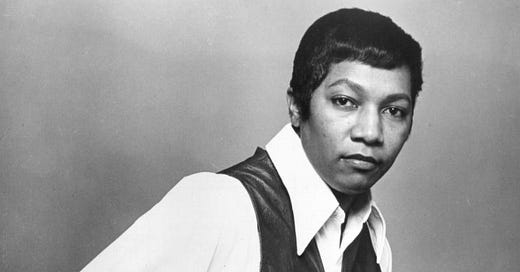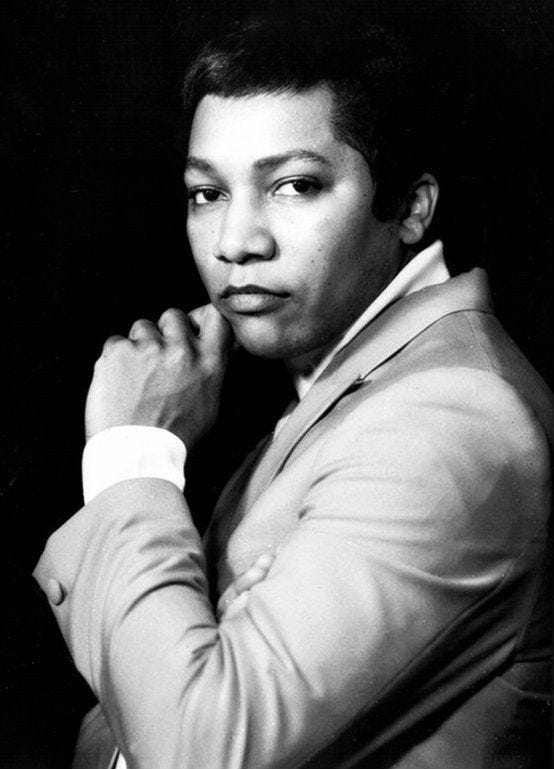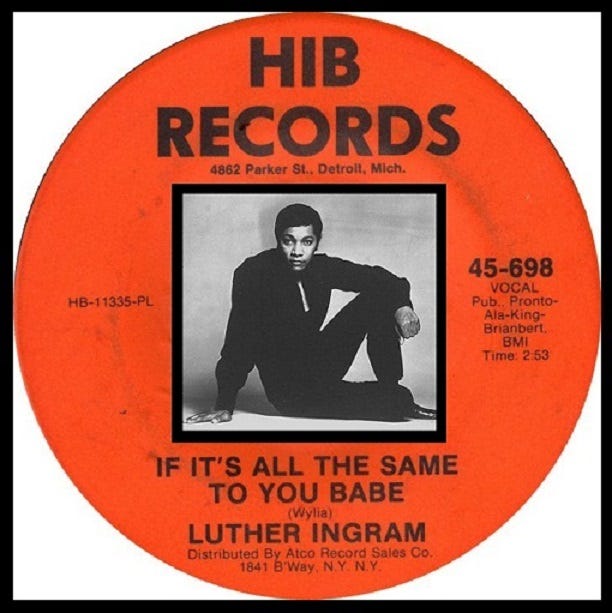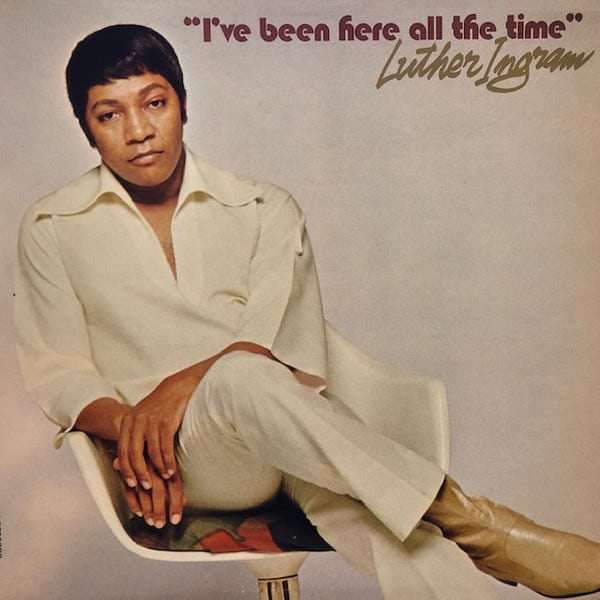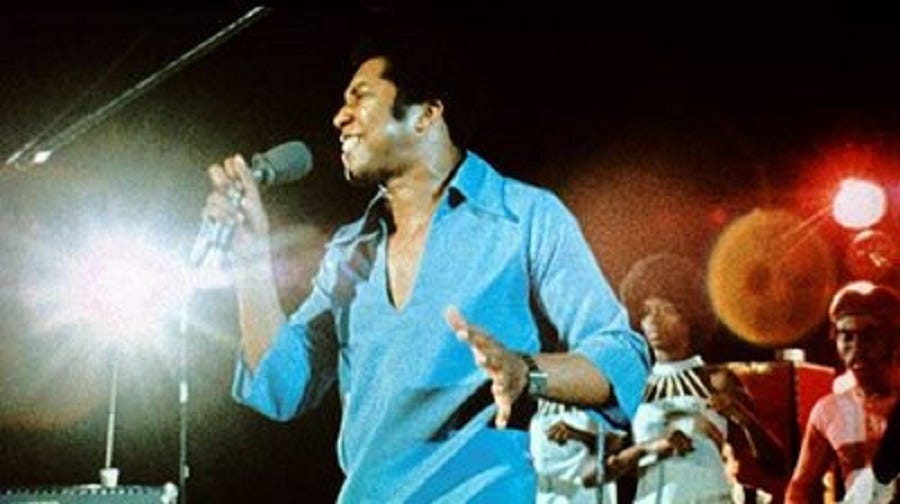Luther Ingram (November 30, 1937 – March 19, 2007) – If It’s All The Same To You Babe (1966)
Backed by the uncredited Funk Brothers, this haunting Northern Soul anthem with "Exus Trek" on the flip was written and produced by Richard "Popcorn" Wylie.
Watch full video on Twitter.
View most updated version of this post on Substack.
Open YouTube playlist of all songs in this post.
The great singer/songwriter Luther Ingram began his career in the 1950s singing gospel and doo wop, released records in the sixties that became Northern Soul classics, and hit his stride in the seventies with 15 of his singles making the R&B charts between 1970-78, including his #1 R&B hit “(If Loving You Is Wrong) I Don't Want to Be Right” (1972).
Born in Jackson, Tennessee, Ingram was one of ten children. He moved with his family to Alton, Illinois when he was ten years old. There, he and his two brothers Archie and Richard formed a gospel group called the Alton Crusaders. They later switched to secular music and sang doo wop, changing their name to the Gardenias.
The group recorded their first and only single for Cincinnati-based Federal Records in 1956, a subsidiary of Syd Nathan’s King Records. At the recording session for “Flaming Love” b/w the rockin’ jam “My Baby’s Tops,” they were backed by Ike Turner and his Kings of Rhythm, who were working as session musicians for Federal at the time. The Gardenias subsequently performed live with Turner and his band to promote the single, but broke up in 1957.
It took Ingram until 1965 to record his first single as a solo artist. On a visit to New York City, he heard from some friends that famed Decca producer Milt Gabler (who had produced “Rock Around The Clock” for Bill Haley & His Comets) was looking for new talent. This led to Decca releasing his heartfelt song “You Never Miss Your Water,” b/w the upbeat soul explosion “Ain’t That Nice.” He co-wrote both sides with Ronald Moseley (later one of Clarence Avant’s Sussex Records partners) and the single’s producer Bob Bateman.
Bateman then co-wrote and produced his second single, the ultra-rare “Run For Your Life” (1965) b/w “I Need You Now” on the tiny Detroit label Hurdy-Gurdy Records. Original copies today sell for nearly $500 on Discogs.
The next year, Bateman and Moseley produced his third single, the superb jam “I Spy For the F.B.I.” (1966), credited to Luther Ingram & the G-Men. Co-written by Detroit songwriter and producer Richard “Popcorn” Wylie (who was Motown’s first A&R head in the early sixties), it did not chart. The song was covered by singer Jamo Thomas a few months later, whose version cracked the Billboard Hot 100 at #98. Its success earned Thomas a spot performing it on the short-lived music show The !!!! Beat, a TV series spotlighting R&B acts that was a Soul Train forerunner. Produced in Dallas, it was nationally syndicated for one season before being cancelled.
Later that same year, Wylie wrote and produced what would come to be Ingram’s most highly regarded record, “If It’s All The Same To You Babe,” b/w a nearly identical instrumental version titled “Exus Trek,” which was co-written by Ingram and Bateman and credited to the “Luther Ingram Orchestra.” In reality, the backing band was Motown’s Funk Brothers.
It was released on the one-off label HIB Records (the “H” reportedly stood for Wylie’s girlfriend at the time, the “I'“ for Ingram, and the “B” for Bateman). Both sides were destined to be huge on the Northern Soul scene in the UK.
In 1967, Ingram began recording for KoKo Records, an independent Memphis label headed by producer Johnny Baylor. His first single was released later that year, “You Got To Give Love To Get Love” b/w the superb jam “I Can’t Stop,” which was written by Ingram and produced by Baylor and Stax producer and executive Al Bell. Ingram’s second release for the label was the heartfelt love song “Missing You” (1967), b/w the funky “Since You Don’t Want Me,” both sides co-written by Ingram and John L. McFarland, produced by Baylor.
The following year, KoKo signed a distribution deal with Stax, resulting in Ingram’s first charting record, “Pity for the Lonely” (1969) which reached #39 R&B. Baylor and Ingram followed it up with “My Honey And Me,” also released in 1969. It was Ingram’s first record to be issued on Stax in addition to KoKo, and his first top-twenty R&B hit at #19. The record’s chart success was probably helped by its very funky B-side “Puttin’ Game Down,” which Ingram would re-record three years later in 1972. It was written by Stacy Johnson, a singer/songwriter who toured with the Ike & Tina Turner Revue, and was later released on KoKo as an A-side b/w “Since You Don’t Want Me.”
Baylor was a controversial figure, with an infamous bodyguard named “Boom Boom.” After KoKo Records became part of the Stax operation, Baylor and his entourage usually showed up armed on their visits to the label’s headquarters. Despite the heavy vibes this partnership created, Ingram’s songwriting talent made an early impact on the label when he co-wrote “Respect Yourself” with staff songwriter Mack Rice, which the Staple Singers took to #2 R&B and #12 on the Hot 100 in late 1971.
Ingram again scored on his own with the slow jam "Ain't That Loving You (For More Reasons Than One)," released in April, 1970, which hit #6 R&B and #45 on the Hot 100, with the heartfelt “Home Don’t Seem Like Home” on the flip. His next few singles were not as successful, although they contained great cuts like “I’ll Just Call You Honey,” a B-side from September, 1970; the funky, hard-hitting “Be Good To Me Baby” released as an A-side in March, 1971 which hit #21 R&B;
and a remade version of “Missing You” (#26 R&B) b/w a cover of Sam Cooke’s “You Were Made For Me” (#18 R&B), issued in January, 1972 as an advance single for Ingram’s debut full-length album I've Been Here All The Time (1972). The LP was mostly a collection of Ingram’s previous KoKo singles.
In the spring of 1972, KoKo released his new single “(If Loving You Is Wrong) I Don't Want to Be Right,” a song originally written for the Emotions by Stax Records songwriters Homer Banks, Carl Hampton, and Raymond Jackson. They recorded it but their version was never released.
Instead, it became Ingram’s biggest-ever hit and signature song, spending four weeks at #1 R&B and peaking at #3 on the Hot 100. Its B-side was a remade, even funkier version of “Puttin’ Game Down.”
Ingram quickly released another album titled (If Loving You Is Wrong) I Don't Want to Be Right to capitalize on the song’s success. He followed his huge hit up with several mostly unremarkable singles, although “I'll Be Your Shelter (In Time of Storm)” b/w a remade version of “I Can’t Stop” reached #9 R&B in late 1972.
It took four years for Ingram to release his next album, Let's Steal Away To The Hideaway (1976) which was again produced by Baylor. Its highlights were all co-written by Ingram and Baylor, including the stellar funky “I Like The Feeling,” which hit #35 R&B as a single in 1977, and the superb LP-only cuts “It’s Too Much” and “Sweet Inspiration.”
Ingram’s final album of the seventies was Do You Love Somebody (1978). Its title track returned him to the upper reaches of the R&B charts at #13, and its second single “Get to Me” also charted (#41 R&B) with the superb “Trying To Find My Love” on its B-side, co-written by Baylor and singer/songwriter Tommy Tate. Sadly, the LP only contained two songs that Ingram co-wrote with Baylor, the heartfelt “Sorry” and the stellar jam “Do You Think There’s A Chance,” the latter which should have been released as a single.
Happy Heavenly Birthday to the great Luther Ingram.
Further info:
“Luther Ingram, 69, Singer of 1970s Soul Hit, Dies,” obituary, The New York Times, March 21, 2007.
“Luther Ingram, 69; R&B; singer, songwriter recorded hit 'If Loving You Is Wrong (I Don't Want to Be Right)',” obituary, Los Angeles Times, March 21, 2007.
“Luther Ingram: Ain't That Lovin' You (For More Reasons Than One),” artist/LP review by Bill Dahl, Bear Family Records.
“Alton's Luther T. Ingram's music is definitely right,” Alton Telegraph, February 27, 2023.
#soul #funk #LutherIngram


